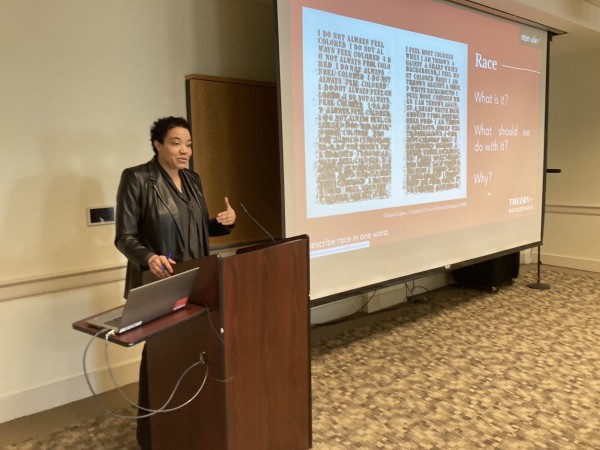GEOG-BSOS Seminar: Why Ending Race is the Future of Antiracism
“George Floyd was killed because he was seen as a racialized black person,” said Dr. Sheena Michele Mason, assistant professor in SUNY Oneonta's English Department during a seminar organized by the Department of Geographical Sciences and the College of Behavioral & Social Sciences on Nov. 6.
During an interactive seminar, Mason discussed the need of dismantling the belief in “race” and the practice of racialization for a future where people’s humanity comes first. Ultimately, she contended that to undo the power imbalances that result from the belief in “race” and practice of racialization, we must undo both.
“Although we are all racialized by ourselves and others, we are raceless,” she said, while presenting the Theory of Racelessness, the framework she uses to explode traditional notions of “race,” humanness, ethnicity, culture, language, and antiracism: “To undo the problem of racism, we have to undo our belief in race and practice of racialization.” She defines racism–which she also spells as race/ism–as a social and/or economic class hierarchy of humans based on the belief in race, practice of racialization, and subsequent reinforcement of various power imbalances (i.e., hierarchies).
Mason's ideas are further explored in her upcoming book The Raceless Antiracist: Why Ending Race Is the Future of Antiracism to be released in February 2024. “I am interested in disrupting the power imbalances —the dehumanizing apparatus— that comes part and parcel with the belief in race and practice of racialization,” she said.
She asserted that seldom heard of and often misunderstood philosophies of race–skeptical eliminativism and constructionist eliminativism–must be explored and part of the conversation about antiracism to create a future without racism. Raceless antiracism–also known as the theory of racelessness–centers and expands skeptical eliminativism and eliminativism, more generally speaking.
How Can You Practice Raceless Antiracism?
Floyd’s humanity was not apparent to all, especially Derek Chauvin, because of the assignment of “race” (i.e., racialization), which is designed to obscure the full humanity of people who get racialized as black, she explained. “It’s the dehumanizing apparatus that tricks too many people into believing in the subhumanness or non-humanness of people racialized as black.”
In any context, racialization–the assignment of a “racial” identity–occurs when one groups seeks to subjugate and oppress another by assigning an identity that is written outside of the category of human. According to Mason, we cannot reconstruct racialization to do the antithesis of what it does, what it is designed to do. If we want to create a future without racism, we must radically change how we think and talk about race/ism to help us generate effective antiracist practices and policies.
Mason shared a booklet [need link] with suggestions on how to center humanity. For example, she recommended translating race into “economic class, social class, culture, ethnicity, racism, or some combination” rather than continuing to naturalize that which is presumed to be “race” or “racial” since that naturalizes and makes permanent the reality of racism.
She’s building an e-learning community with support from the Mercatus Center at George Mason University. The first course will be launched in the spring. Visit her website or follow her on Twitter for more information.
Watch the full seminar below:
{"preview_thumbnail":"/sites/geog.umd.edu/files/styles/video_embed_wysiwyg_preview/public/video_thumbnails/O8CdGD8J6Ag.jpg?itok=XHmhvgqI","video_url":"https://www.youtube.com/watch?v=O8CdGD8J6Ag","settings":{"responsive":1,"width":"854","height":"480","autoplay":0},"settings_summary":["Embedded Video (Responsive)."]}
Following the seminar, Mason joined a small reception organized by a group of graduate students and faculty members of the Department of Geographical Sciences’ Diversity, Equity, Inclusion, and Anti-Racism (DEIAR) Committee.
Main image: Dr. Sheena Michele Mason presents her lecture on Nov. 6 in the Adele H. Stamp Student Union.
Published on Fri, 11/10/2023 - 09:40


